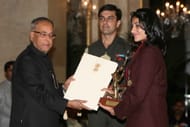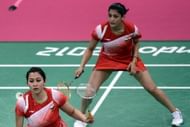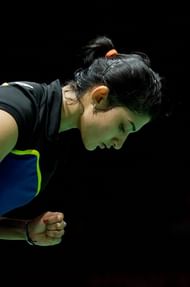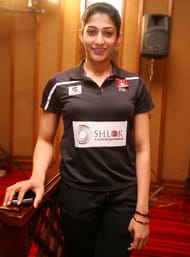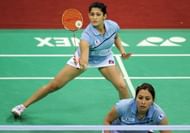On 14th Oct, 2010, in the Siri Fort Stadium, New Delhi, the final score-line of the finals of the CWG women’s doubles Badminton read India 2, Singapore 0.
Two newbies, Ashwini Ponnappa and Jwala Gutta, representing India, won the Gold medal, beating Mulia and Yao Li 21-16, 21-19. The crowd was showing all the emotions known to humans, well almost.
Most of the supporters, who were Indians, were cheering and shouting with joy and doing all the insane things that we Indians generally do when in a jolly mood. On the other hand, there were a few Singaporean supporters who were shocked in disbelief (some were even crying), realizing that the comparatively stronger and favourite Singaporean pair lost to the “Indians” in straight sets.
Note – The term Indians, in the above line, is quoted within the double inverted commas because it was the first time that India had won a medal in the women’s doubles category in Badminton.
“It was something that cannot be put into words, something you cannot explain, it was a feeling that can only be experienced”, said Ashwini, when asked about how she felt after winning the gold medal.
“We were just taking it point by point, and it was only after the crowd’s exuberance [that we started celebrating] and it took us a couple of seconds to realize that we had actually won, and we just jumped out of joy,” continues Ashwini, laughing while at it.
She further added, “When we won, I was over the moon. Since it was in India, the crowd support was really strong and it did help. Standing on the podium, getting the gold medal and singing the National Anthem along with thousands of other people; it was simply amazing.”
From Karakoram Pass in Jammu & Kashmir to Indira Point in the Nicobar Islands, from Kutch in Gujarat to Kibithu in Arunachal Pradesh, there’s no scarcity of talent in this part of the world. But being talented is one thing and using one’s talent appropriately is another.
Ashwini was born talented. According to her mother, Ashwini was a hyperactive kid and to keep her occupied, she used to hand her a badminton racket and throw paper balls at her and apparently, she could connect the racket to the paper balls pretty well.
When asked whether she remembers all that, she said, “I don’t remember much about the early days, but I do remember playing with my parents and my friends outside our house and really enjoying myself. I was sent to a summer camp at the age of 8 to YMCA, and as I was sort of good at it. I was later put into coaching classes at youth centre where I had a wonderful coach named Umapathi, and that is where it all started for me.”
A Google search may tell you that she’s one of the finest female doubles players this country has ever produced, but it won’t tell you how much of hard work she had to put in to become one of the finest.
It may also tell you that she won the gold medal (along with Jwala Gutta in badminton women’s doubles category) in the 2010 CWG and bronze (along with the same partner in the same category) in the 2011 World Championships for India, but it won’t tell you that, as a kid, she used to believe that Indians are the best and no one could defeat us.
Following up is an interview with Ashwini Ponnappa, to know things about her that each fan of her should know, and as fellow Indians, each Indian should be proud of.
How was your childhood? How were you in studies?
My childhood was pretty good. It was like [that of] most other kids, but with the inclusion of badminton coaching classes in my case.
I have wonderful parents, who made sure that I went to a good school and was also pushed towards what I loved, which was badminton, with [my parents] running around and taking me for coaching and tournaments despite both of them having full time jobs.
My coaches in the Prakash Padukone Academy were particular that most of the school kids went to school and did not ask us to take time off to practice all day as they believed it was important for us to go to school.
Once I got to high school, it was different as I knew I wanted to do well in badminton, and my training started getting more serious. My school principal encouraged me and gave me permission to leave an hour early to go for practice.
If it wasn’t for the encouragement I got from the principals and my teachers in my school and both my colleges (to whom I’m extremely thankful to), I wouldn’t have been able to finish my entire schooling in the same school and finish my college with a degree, and most importantly, wouldn’t have been able pursue my badminton dreams along with finishing my education.
I was an average student. I wasn’t as good at it as I was into sports. My parents did not put too much pressure on my studies but were just particular about me getting to the next class as they knew I loved badminton and was doing well in it. I did my schooling and 1st & 2nd PU in Bangalore, and then finished my degree in Commerce in Hyderabad.
Did you take part in any other sport?
I did not take part in any other sports as I had no time and hence wasn’t too interested in anything else. The only thing apart from badminton that I have done was athletics in school. I was naturally fast and hence was a good sprinter and long jumper.
There must have been times when in spite of giving your best, you weren’t getting the desired result. In such cases, would you get exasperated or maintain composure and keep trying?
Well, most sportspersons go through that. You train and work really hard and give your best and just do not get the results. I’ve gone through that a lot of times too, and still go through that sometimes.
I used to get exasperated and emotional during my early days, because I’d feel really bad. But I’ve managed to cope with the situation because of the help of my parents and a really good friend, Ashlesh, to whom I first went to at the age of 12.
He helped me a lot with my mental training then, and showed me how to enjoy and made me realize that I played my best when I had fun on the court. I won my first singles state tournament after his help, as I had fun and didn’t put too much pressure on myself.
How difficult was it for your parents given that you had to travel too often?
It was pretty difficult, especially with both of them working. My dad travelled with me for most of my tournaments, and mum was at home looking after my younger brother who had asthma.
You come from a family which has a sporting background. Did that have an impact in your life?
It did have an impact, as they understood sports really well because of the sporting background, and encouraged me to take up sports as I was good at it and did not stress too much on my studies.
My parents loved sports and enjoyed watching me play. Since dad played hockey for the state and played football and cricket for the bank, he was pretty fit and helped me with my physical fitness during tournaments and in the off-season when we didn’t have any training, and mum helped me with my diet and making sure I ate right, and keeping me calm.
The most important aspect is that they were with me always, irrespective of what happened in the match, and encouraged me to follow my dream of playing badminton and doing really well.
What was your daily routine like?
Well, my daily routine then was quite different because I had to manage both, my school as well as college along with training. Luckily, I had wonderful principals both in school and colleges.
My principal in my school let me leave school early for practice, and when I was in college, I was given permission to take off from college to train.
So my daily routine was waking up and starting my day with physical fitness in the ground at around 0600 hours, then get done and rush home to get ready for school which started at 08:30 hours. Then I would leave school at around 14:15 hours for practice, when school actually got over at 15:30 hours.
I would finish practice and head back home at around 18:30 hours. Once I got to college, it was more training and no college except during my exams. So my entire day was filled with training sessions and practice along with resting and eating.
Were there any individuals you drew inspiration from, any role-models?
Not really. As kids, we were just asked to sit and watch others and learn from them but I didn’t really enjoy that. Until the under-16 category I did not have any big dream and ambition; my goals were big, such as winning the state championships and getting onto the state team and winning the nationals.
I did not have any role models as such, but as I got older, I started enjoying watching other players play, as I could picture myself playing strokes that I liked and tried to implement that to my game. So ever since, I love watching others play and feel that I can learn from everyone.
Tell us something about your experience in the CWG.
When we went there, I didn’t really have a name, so it was taking a step at a time. The first match that we had was against the Malaysians who were really tough to beat.
We, Jwala and I, didn’t think about anything else. We just focussed on the match point-by-point. And that’s exactly how we tackled every match in the tournament. I didn’t even realize that we had won. I just thought that the crowd really roared because we were leading and had earned another point.
It was only when Jwala told me that we won, did I realize that whoa, we had won! And that’s what I have been following ever since.
We kept setting small targets, and that really helped us achieve our aim. After we won, I thought it was like winning any other tournament. I was like, yay, we won, let’s go home and celebrate. But it was only the next day did I realize that it wasn’t like winning any other tournament.
We had won the Commonwealth Games, in our country, in front of the home crowd. Things changed after that.
Was there any instance when Jwala’s and your ideas clashed?
Not quite, Mehul. Had that happened, I don’t think we could have won. Both of us were on the same page, and both of us were gunning to do well.
We knew that the 1st round was a tough one, and we weren’t too sure whom we’d be playing in the next round. What mattered was getting through the 1st round and that’s what we did.
We both were really determined to win. The environment of the entire tournament was also good. We enjoyed on the court as well as off it.
Off the court, we were relaxing and interacting with other players and enjoying ourselves, but on-court, we were totally focused, and we knew what we wanted to do.
How was the experience different in the London Olympics?
It was different because there were expectations from us. Until then, India had never qualified in the doubles category, and it was an opportunity for us to qualify in all 3 doubles category.
The most exciting thing was getting to know that we had qualified but, unfortunately, Sanave and Rupesh missed out on qualifying for Men’s doubles.
It’d have been really great had we qualified in all 3 categories because we did put in a lot of hard work.
Apart from that, we (Jwala and I) really focused on the job at hand, and we knew that we could do it. What happened there was quite unfortunate. But we have to move on. Sometimes, such things happen.
When did playing for the country become a dream?
Well, once I started getting older, once I got into the under-16 category and then the under-19 category, I was gunning to make it to the junior’s squad and represent India.
Until I was selected in the under-19 category, I used to play in both, in doubles as well as in singles. But once I got selected in the national camp as a doubles player, it was really difficult to cope up with both [categories].
After putting in a lot of hard work, I got to represent India in the Junior World Championships. My partner, Nitya [Krishinda Maheswari] and I had won a lot of national tournaments.
When we went there, I believed we could do really well and I used to think that Indians are the best. I was new to the international circuit and didn’t know who all were good. I just basically thought that Indians were the best. And this exposure made me learn a lot of things.
I realized that there are other countries who are playing, who are working really hard, who are doing really well and that is when I actually started dreaming big and started putting in a lot more hard work in order to do well.
As a kid, did you ever miss practice when, say, your friends would go out for some kind of entertainment or when your cousins would come over to your place or some such thing?
When I was a kid, and before the dream to represent India cropped in, I used to stay busy with the state championships and the nationals, and in order to win the All India Tournament, I had to practice and train and that became the core part of my life; it still is.
I was quite adamant about my training, and I loved it because the place where I was training was Prakash Sir’s Academy and we had a huge group of girls with whom I was training there.
The environment there was very good as all the kids who were training there were good. When you see your peers working hard, it makes you also work hard, makes you want to do well.
It was nice, it was a competitive and amazing feeling when you are working hard and you are enjoying yourself and you know that if you want to do really well in the state and national championships, you better train for it and not regret later of missing out on it.
I’ve been playing badminton since I was 8 years old and I’ve been playing the All India tournament since I was 12, and once you’re in the All India tournament, you realize that everyone’s working really hard to do well, everyone’s managing their studies along with their games and everyone’s travelling. I realized that in order to do well, you’ve got to work really hard.
Apart from that it was fun too. When I won the junior’s under-16 national championship with Nitya, the top eight of us were from Prakash Sir’s academy.
There are kids in the not-so-affluent regions of our country who are really good but can’t afford moving to a nearby city in order to get enrolled in a good badminton academy. Can’t badminton academies open up in such regions?
Now that badminton is an upcoming sport, there are many new academies opening [in new regions], and there are kids who are taking interest in badminton.
It’s a slow process; it’s not like it is in China or Malaysia, we’re getting there slowly, but steadily, which is good. As of now, badminton is very popular in places like Bangalore, Hyderabad etc. and there are a lot of academies there.
Can’t something like scouting be done to search for new talented badminton players across the country?
It’d be great if there’s something like that; that’d be amazing. I’m sure in the near future something like that will happen and hope it starts happening soon.
It is something that’s important and, at the same time, it needs to be done in a fair manner. I mean, you can have scouting but then, the ones who deserve may not get picked and if that happens, it would be pointless.
So, according to me, what’s important is whatever is being done should happen fairly. There should be a fair and open policy, as in it should be open to everyone and done on the basis of merit, and not something that’s hidden and biased.
Are there any loopholes or politics involved in this game?
Um, that’s something I can’t answer Mehul.
We belong to the generation which finds it really easy to get distracted because of the gadgets around us? Does it affect you?
Well, when I practice, I just practice and I guess, that’s what every sportsperson does.
But yes, I do check my phone during the break and yes, we are a bit hooked onto gadgets (I’d be lying if I say that I’m not). But, at the same time, it doesn’t affect me or my game because I know what we want to do and I’m well aware of the job at hand.
It was a pleasure interviewing you, but before winding up, one last question - Your fans, including me, expect a lot from you. Do you expect anything from us, the fans?
I think, as of now, we are getting a lot of support from you all which is really nice. Knowing that you have fans who really want you to do well gets you going and want to achieve more.
And it helps a lot more when you’re going through a bad patch. When you know that there are people who admire your game and like you for your game, it really motivates you and at the end of the day, it really matters.
Thanks for all the love you all have been showering. It means a lot!
We’ll always be there for you. All the very best for the World Championships and the IBL! Hope you do really well!
Thanks Mehul and all the best to you too. Take care!
